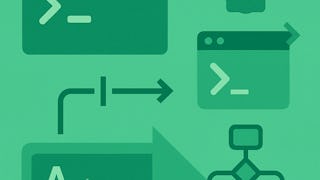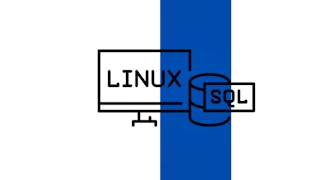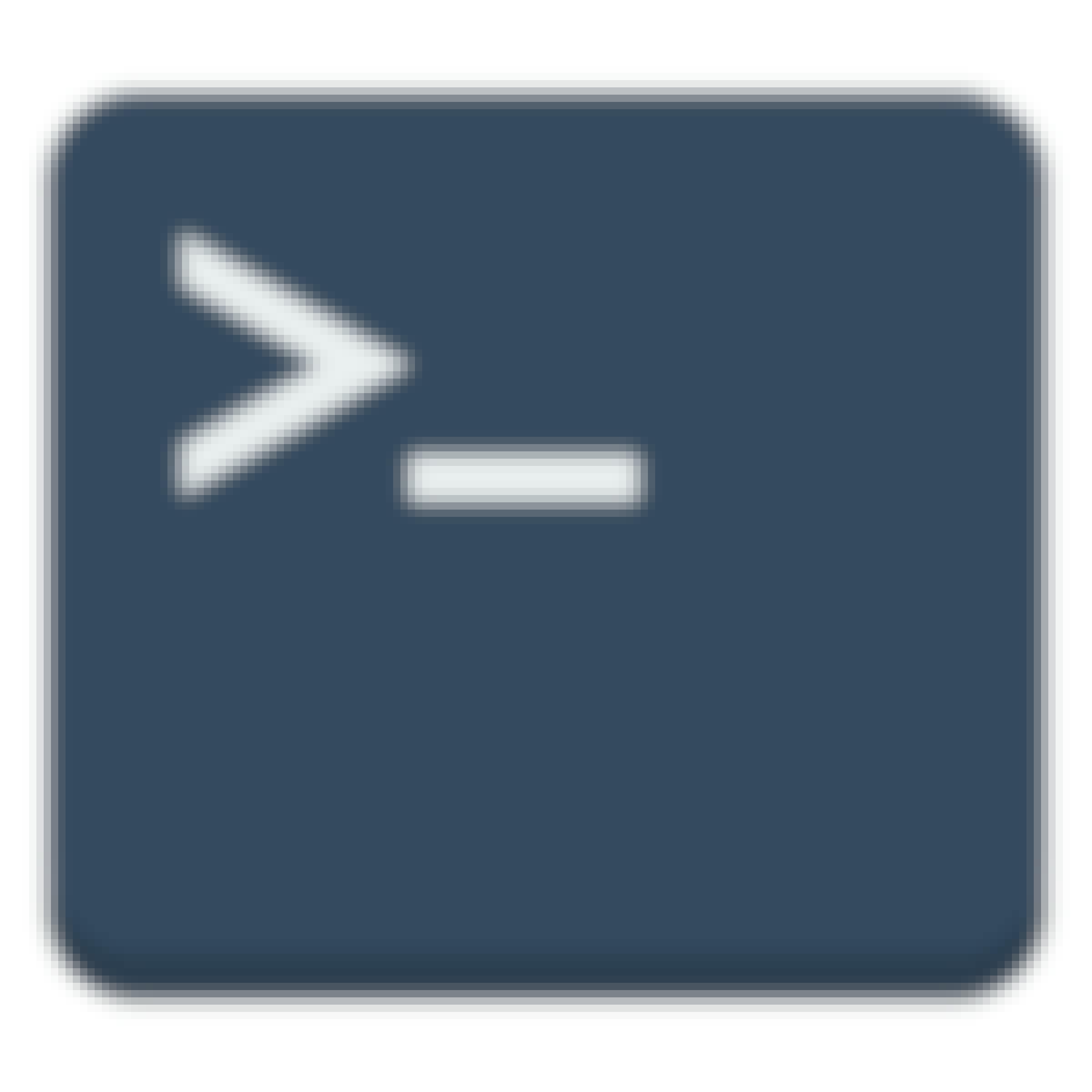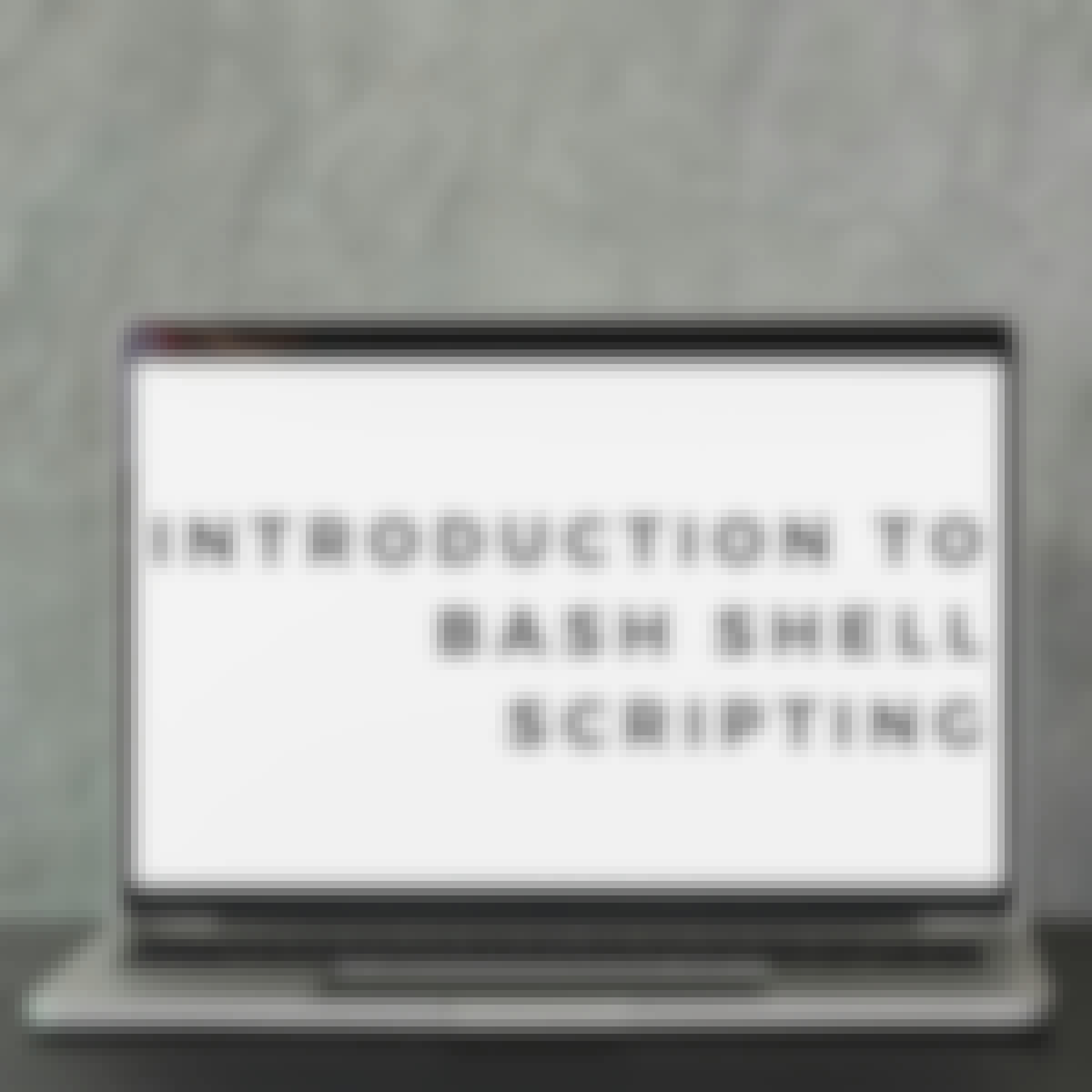- Browse
- Shell Scripting
Shell Scripting Courses
Shell scripting courses can help you learn how to automate tasks, manage system processes, and manipulate files efficiently. You can build skills in writing scripts for data processing, scheduling jobs, and error handling. Many courses introduce tools like Bash, awk, and sed, that support executing commands and processing text in Unix-like environments. You'll also explore concepts such as variables, loops, and functions, enabling you to create robust scripts that enhance productivity and streamline workflows.
Popular Shell Scripting Courses and Certifications
 Status: Free TrialFree Trial
Status: Free TrialFree TrialSkills you'll gain: Linux Commands, Bash (Scripting Language), Shell Script, File Management, Linux, File Systems, Unix Commands, Scripting, Command-Line Interface, Ubuntu, Linux Administration, Unix, Operating Systems, Network Protocols, OS Process Management, Automation, Software Installation
4.6·Rating, 4.6 out of 5 stars1.7K reviewsBeginner · Course · 1 - 4 Weeks
 Status: Free TrialFree Trial
Status: Free TrialFree TrialSkills you'll gain: Bash (Scripting Language), Test Automation, Unit Testing, Scripting, Software Testing, Linux Commands, Test Driven Development (TDD), Unix Commands, Development Environment, Operating Systems, Command-Line Interface, File Management, OS Process Management, File Systems, Automation, Python Programming
4.7·Rating, 4.7 out of 5 stars6.6K reviewsBeginner · Course · 1 - 3 Months
 Status: Free TrialFree Trial
Status: Free TrialFree TrialSkills you'll gain: Shell Script, Package and Software Management, Linux Administration, Linux Commands, Unix Shell, Systems Administration, Hardening, Unix Commands, Patch Management, Scripting, System Monitoring, User Accounts, Dynamic Host Configuration Protocol (DHCP), System Configuration, OS Process Management, Firewall, Process Management
Advanced · Course · 1 - 4 Weeks
 Status: Free TrialFree Trial
Status: Free TrialFree TrialSkills you'll gain: Windows PowerShell, Active Directory, Scripting, Test Script Development, IT Automation, Network Monitoring, Microsoft Windows, Windows Servers, Scripting Languages, User Accounts, Microsoft Servers, Event Monitoring, Command-Line Interface, Network Administration, Remote Access Systems, User Interface (UI), Server Administration, Hypertext Markup Language (HTML), Data Import/Export, Authentications
4.5·Rating, 4.5 out of 5 stars14 reviewsBeginner · Specialization · 1 - 4 Weeks
 Status: NewNewStatus: PreviewPreviewB
Status: NewNewStatus: PreviewPreviewBBirla Institute of Technology & Science, Pilani
Skills you'll gain: Linux Commands, Shell Script, Unix Commands, Operating System Administration, Systems Administration, File I/O, Data Management, Process Management, Software Development, Computer Security
Intermediate · Course · 1 - 3 Months
 Status: Free TrialFree Trial
Status: Free TrialFree TrialSkills you'll gain: Bash (Scripting Language), Operating Systems, File Systems, Linux Commands, Linux, SQL, Unix, Database Management, Command-Line Interface, Relational Databases, Authorization (Computing), Authentications, User Accounts
4.8·Rating, 4.8 out of 5 stars6.1K reviewsBeginner · Course · 1 - 4 Weeks
What brings you to Coursera today?

Skills you'll gain: Bash (Scripting Language), Shell Script, Unix Shell, Scripting, Linux Commands, Windows PowerShell, Linux, IT Automation, Unix Commands, Unix, Debugging, Automation, Remote Access Systems, Development Environment, System Monitoring, Restful API
Intermediate · Course · 3 - 6 Months
 C
CCoursera
Skills you'll gain: Bash (Scripting Language), Shell Script, Scripting, Command-Line Interface, Unix Shell, Unix Commands, Linux Commands, Unix, Linux, File I/O, File Management
4.6·Rating, 4.6 out of 5 stars61 reviewsIntermediate · Guided Project · Less Than 2 Hours
 C
CCoursera
Skills you'll gain: Bash (Scripting Language), Shell Script, Unix Shell, Scripting, Linux Commands, Unix Commands, Command-Line Interface, Linux, File Management, Unix, File Systems, Systems Administration
4.5·Rating, 4.5 out of 5 stars679 reviewsBeginner · Guided Project · Less Than 2 Hours

Skills you'll gain: Bash (Scripting Language), Shell Script, Unix Shell, Scripting, Linux Commands, Unix Commands, Linux, Command-Line Interface, User Interface (UI), Graphical Tools, Debugging
Advanced · Course · 1 - 3 Months
 Status: NewNewStatus: Free TrialFree Trial
Status: NewNewStatus: Free TrialFree TrialSkills you'll gain: Bash (Scripting Language), Shell Script, Linux, Scripting, Linux Commands, Linux Administration, Unix Shell, Operating System Administration, Data Persistence, Unix Commands, Systems Administration, Command-Line Interface, IT Automation, Unix, Cloud Hosting, Object-Relational Mapping, YAML, Python Programming, File Transfer Protocol (FTP), Automation
4.9·Rating, 4.9 out of 5 stars45 reviewsBeginner · Specialization · 3 - 6 Months
 Status: NewNewStatus: Free TrialFree Trial
Status: NewNewStatus: Free TrialFree TrialSkills you'll gain: Infrastructure as Code (IaC), Scripting, Cloud Deployment, Data Persistence, Python Programming, Command-Line Interface, Virtual Machines, Data Pipelines
Intermediate · Course · 1 - 4 Weeks
Searches related to shell scripting
In summary, here are 10 of our most popular shell scripting courses
- Hands-on Introduction to Linux Commands and Shell Scripting: IBM
- Using Python to Interact with the Operating System: Google
- Advanced Linux Administration and Shell Scripting: Packt
- Practical Windows PowerShell Scripting: Pearson
- Linux Commands & Shell Scripting: Birla Institute of Technology & Science, Pilani
- Tools of the Trade: Linux and SQL: Google
- Learn Bash Shell Scripting for Automation: Packt
- Shell Scripting with Bash: Basics: Coursera
- Introduction to Bash Shell Scripting: Coursera
- Linux Shell Scripting - Advanced: Packt
Frequently Asked Questions about Shell Scripting
Shell scripting is a powerful tool used to automate tasks in Unix-like operating systems. It involves writing a series of commands in a text file that the shell interprets and executes. This is important because it enhances productivity by allowing users to automate repetitive tasks, manage system operations, and streamline workflows. By mastering shell scripting, individuals can improve their efficiency and effectiveness in various technical roles.
With skills in shell scripting, you can pursue various job roles, including System Administrator, DevOps Engineer, Software Developer, and IT Support Specialist. These positions often require proficiency in automating tasks, managing servers, and developing scripts to enhance system performance. The demand for shell scripting expertise is prevalent in tech companies, startups, and organizations that rely on Linux-based systems.
To learn shell scripting effectively, you should focus on several key skills: understanding the command line interface, familiarity with Linux commands, knowledge of scripting syntax, and debugging techniques. Additionally, grasping concepts like variables, loops, and conditionals will significantly enhance your scripting capabilities. These foundational skills will empower you to write efficient and effective scripts.
Some of the best online courses for learning shell scripting include Hands-on Introduction to Linux Commands and Shell Scripting and Linux Commands & Shell Scripting. These courses provide practical experience and cover essential topics to help you build a solid foundation in shell scripting.
Yes. You can start learning shell scripting on Coursera for free in two ways:
- Preview the first module of many shell scripting courses at no cost. This includes video lessons, readings, graded assignments, and Coursera Coach (where available).
- Start a 7-day free trial for Specializations or Coursera Plus. This gives you full access to all course content across eligible programs within the timeframe of your trial.
If you want to keep learning, earn a certificate in shell scripting, or unlock full course access after the preview or trial, you can upgrade or apply for financial aid.
To learn shell scripting, start by familiarizing yourself with the command line interface of your operating system. Next, explore online courses that provide structured learning paths. Practice writing scripts for simple tasks, gradually increasing complexity as you gain confidence. Engaging with community forums and resources can also enhance your learning experience.
Typical topics covered in shell scripting courses include basic commands, script structure, variables, control flow (if statements, loops), functions, and error handling. Advanced courses may also explore debugging techniques, file manipulation, and automation of system tasks. These topics provide a comprehensive understanding of how to effectively use shell scripting in real-world scenarios.
For training and upskilling employees, courses like Learn Bash Shell Scripting for Automation and Advanced Linux Administration and Shell Scripting are excellent choices. These courses focus on practical applications and advanced techniques, making them suitable for enhancing the skills of the workforce.










